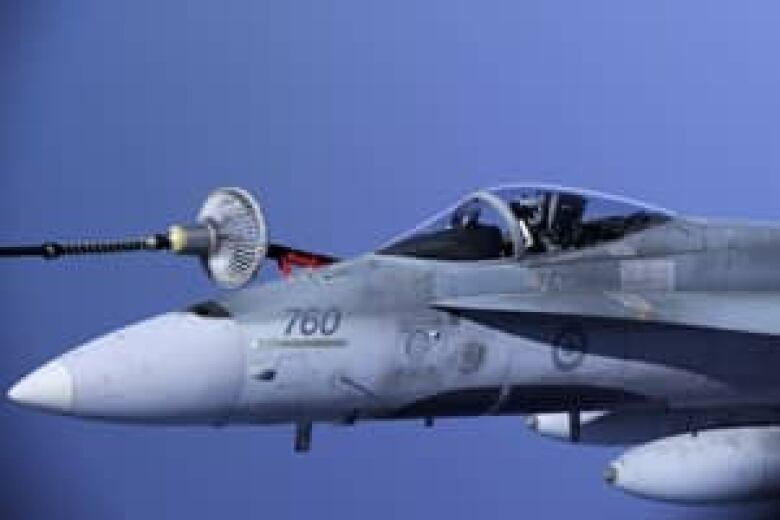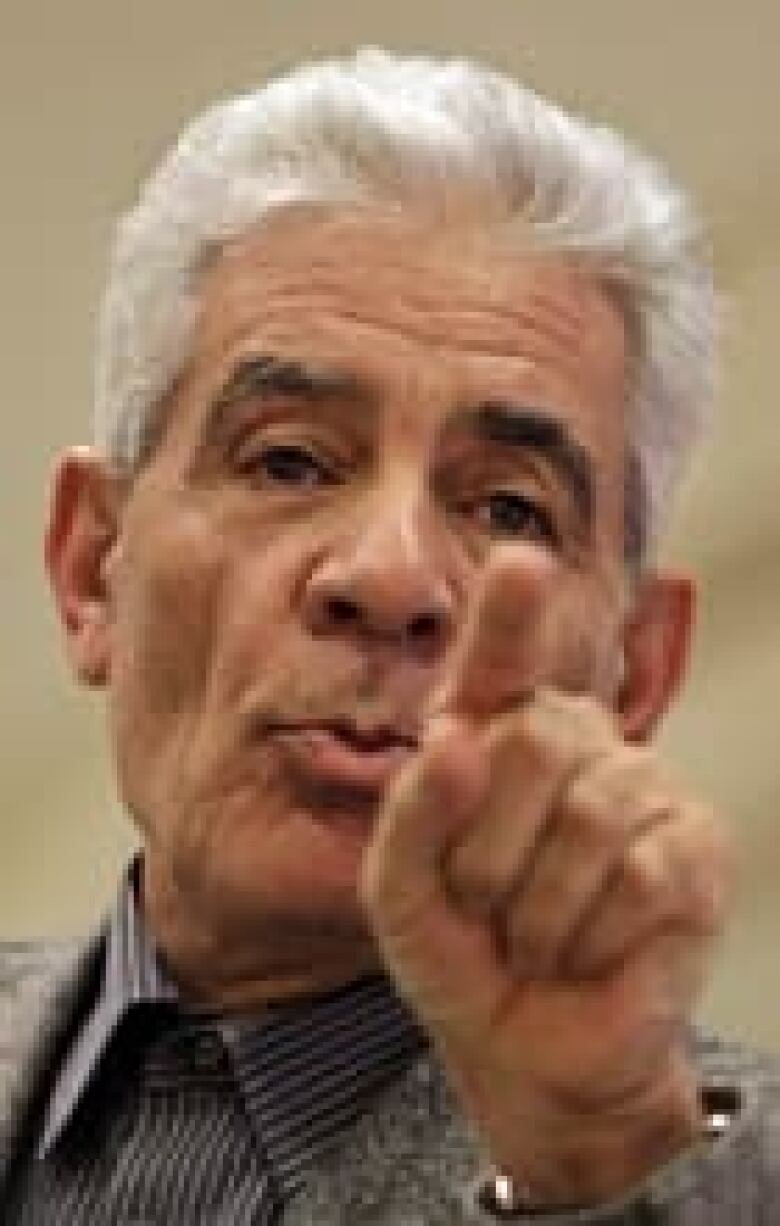Libyan rebels retreat to Brega
Gadhafi's foreign minister defects in U.K.
Latest
- Libyan foreign minister defects in U.K.
- CIA operatives working in Libya: report
- Libyan diplomats expelled from Britain
Libyan rebelshave retreated from the key oil port of Ras Lanouf along the coastal road aftercoming under heavy shelling from ground forces loyal to leader Moammar Gadhafi.
NATO planes flew over the zone of the heaviest fighting Wednesday and explosions were heard,suggesting a new wave of airstrikes against Gadhafi's forces.
In nearby Brega, however, there was no sign of any aerial bombardment.
"They're waiting for those airstrikes," CBC News reporter Margaret Evans said. "What they're fleeing here are Gadhafi forces, flying down the highway. "There's quite a panicked scene in front of me."
By late afternoon local time, Gadhafi's forces had taken the key oil towns of Ras Lanouf and Bin Jawad and were pushing the rebels back toward Brega.

"We don't know why they're not here," rebel soldier Moftah Mohammed, 36,said ofthe lack of airstrikes."Our forces are mainly on the side of the main road. We've heard Gadhafi's forces are pushing deep into the desert" in an attempt to head off rebel forces. "We don't want to be stuck in the middle of that."
Rebel Col. Abdullah Hadi said he expected the loyalists to enter Brega by Wednesday night.
"I ask NATO for just one aircraft to push them back. All we need is air cover and we could do this. They should be helping us," Hadi said.
As the fighting approached Adjabiya, residents fled from the western side of the city, and the highway east to Benghazi was filled with families in vehicles packed with their belongings.
NATOairstrikes haveneutralized Gadhafi's air force and pounded his army, but the government'sground forces remain far better armed, trained and organized than the opposition.
They have also adopted new tactics, a U.S. intelligence official said, fitting civilian vehicles with battle weapons and leaving behind their armoured vehicles, making it more difficult for the coalition to identify targets.
Rebels have few weapons more powerful than rocket-propelled grenades and machine-guns, and are no match for Gadhafi's tanks and longer-range heavy weapons.
CF-18s struck a target near Misrata Tuesday night, said Maj.-Gen. Tom Lawson, assistant chief of the air staff.
"Last night, two CF-18s flew an air-to-ground mission in the vicinity of Misrata and the target was hit, and the effects of that mission are being assessed as I speak," Lawson said Wednesday.
Diplomatic pressure
In another development, Britain's Foreign Office said Wednesday that Libya's foreign minister, Moussa Koussa,had arrived inthe U.K. and resigned from his post.

"We encourage those around Gadhafi to abandon him and embrace a better future for Libya that allows political transition and real reform that meets the aspirations of the Libyan people," the Foreign Office said in a statement.
Thedefectioncame a day after world leadersmet to co-ordinate international opposition to Gadhafi's rule.
"Gadhafi has lost the legitimacy to lead, so we believe he must go," U.S. Secretary of State Hillary Clinton said after meeting with more than 40 world leaders in Londonon Tuesday.
"We're working with the international community to try to achieve that outcome," Clinton told reporters.
Britain said Wednesday ithad expelled five Libyan diplomats from the country on national security grounds.
Foreign Secretary William Hague told the House of Commons he had ordered the officials to leave following concerns about their actions in Britain.
"The government also judged that, were these individuals to remain in Britain, they could pose a threat to our security," Hague told MPs.
British officials said the Libyan diplomats were regarded as the leading supporters of Gadhafi at the embassy, and had been involved in attempts to harass supporters of the Libyan opposition in Britain.
Prime Minister David Cameron said the country believes that UN Resolution 1973 could be interpreted to allow foreign nations to supply weapons to the Libyan rebels. But he stressed that Britainhas not decided whether it will do so.
CIA operatives in Libya: report
A report in the New York Times on Wednesday said that clandestine Central Intelligence Agency operatives inside Libya were gathering information for military airstrikes and establishing contacts with rebels.
And British officials told the Times that MI-6 operatives and special forces were on the ground directing airstrikes and providing intelligence about government military positions.
The Times report also said the U.S. military was monitoring Libyan troops with U-2 spy planes, a Global Hawk drone and a special aircraft, JSTARS, that tracks large troop movements.
The Associated Press reported that the CIA had helped extract the weapons specialist of an F-15E fighter that crashed on March 21. He had first been picked up by rebels, while the pilot was rescued by U.S. marines.
U.S. Defence Secretary Robert Gates and Secretary of State Hillary Clinton spoke to House members in a closed-door briefing on Libya in Washington, D.C., on Wednesday.
Representatives said they were told the mission had cost more than half a billion dollars so far and could cost an additional $40 million per month, with no clear exit strategy.
No decision had been made yet on arming the rebels, the representatives reported, a controversial issue among members of the international coalition.
Value of arming of rebels debated
Shashank Joshi, a defence expert with the Royal United Services Institute, told CBC News Network that UNResolution 1973 authorizes all necessary means to protect civilians under threat of attack, which could be interpreted to allow arming the rebels.
"But the real concern is, would it be effective?" he said.
"The Arab allies outside of NATO are extremely worried that this mission will degenerate into taking sides in a civil war," Joshi said.
"I think the real vulnerability of these rebels is not weapons but organization. They are amateurs, they don't have direction. They have very few senior officers guiding them. So we can arm them to the teeth, but would that help take Tripoli? I think not."
A political settlement with the regime will be necessary, Joshi said.
"We've learned the lesson of violent regime change from Iraq," he said. "What we don't want to see is a destructive and bloody siege of Tripoli."
Uganda offers asylum to Gadhafi
Uganda became the first country to publicly state on Wednesday that it offer asylum to Gadhafi should he seek exile. A spokesman for the Ugandan government said it was not offering special treatment for the Libyan leader, as it has been the country's policy to grant asylum because of the large numbers of Ugandans who fled during the rule of Idi Amin.
The idea that Gadhafi might be allowed to leave Libya without being punished for any crimes committed during his brutal, 42-year reign has angered many inside the North African nation.
With files from The Associated Press












_(720p).jpg)


 OFFICIAL HD MUSIC VIDEO.jpg)
.jpg)



























































































